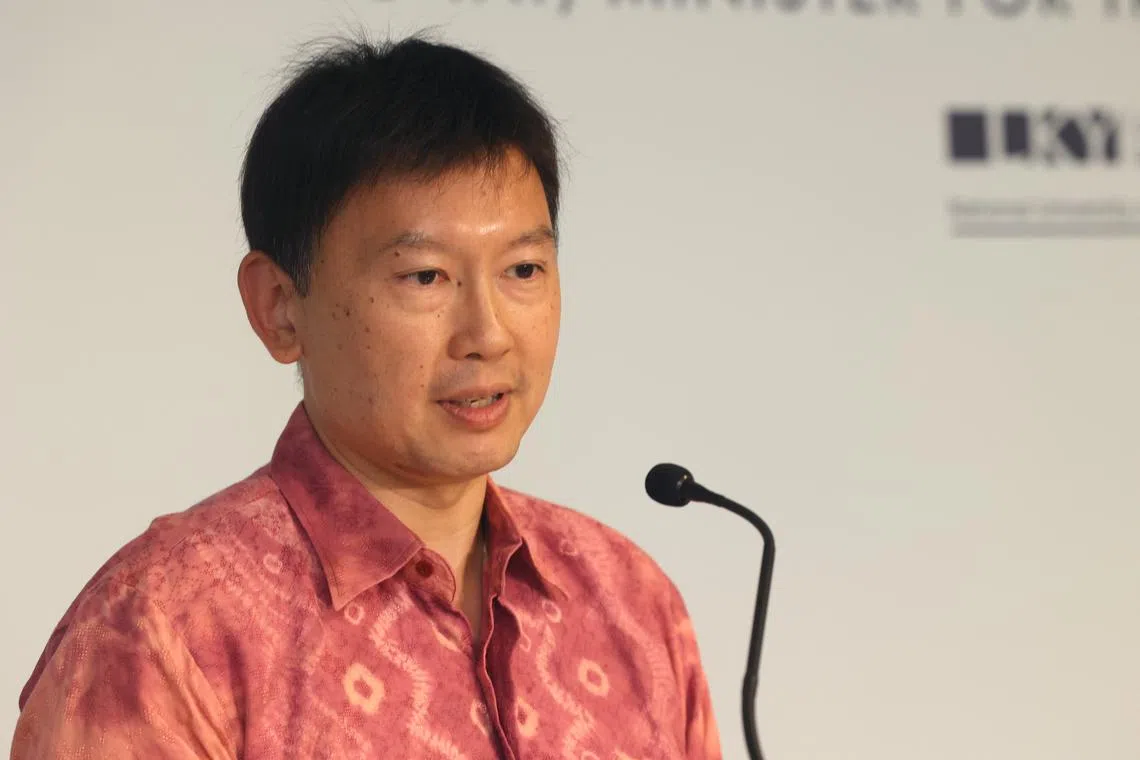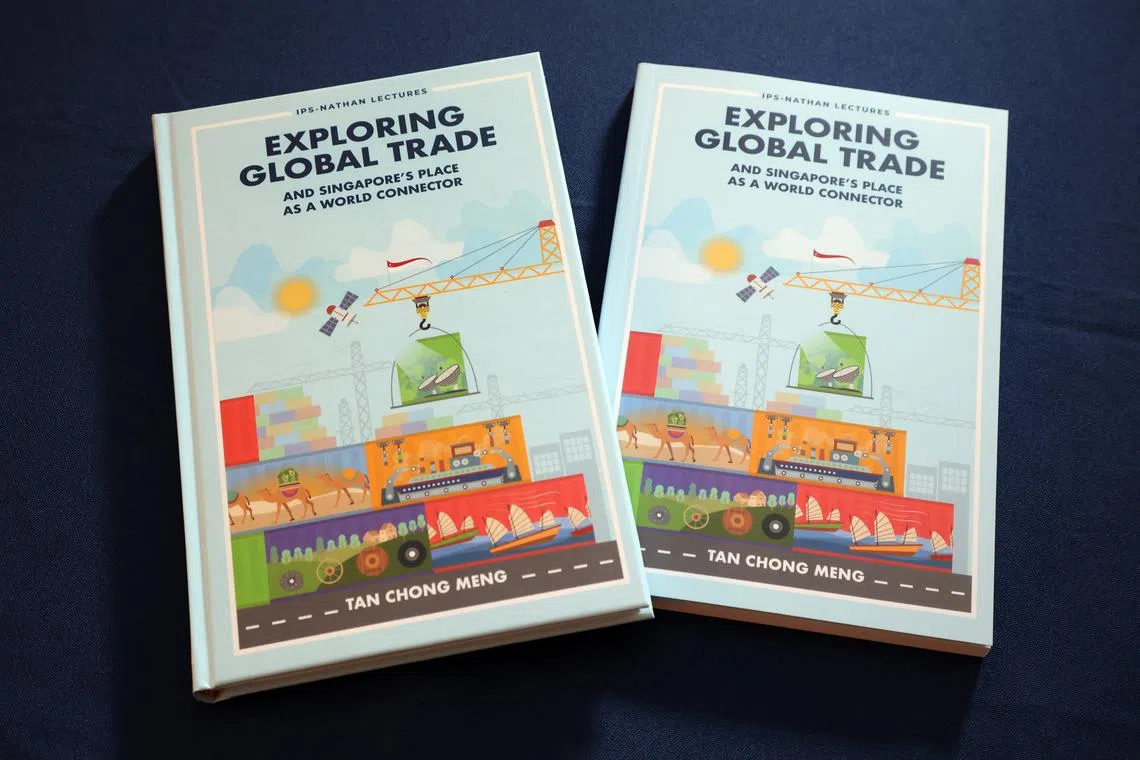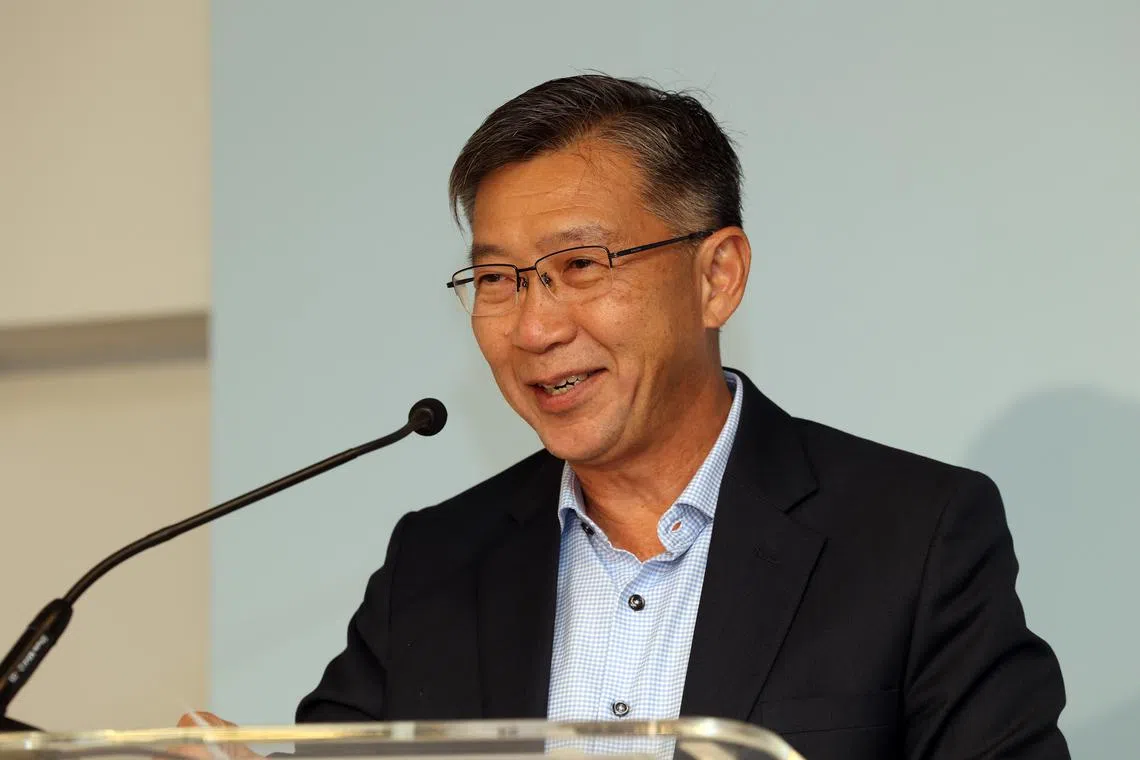Recent geopolitical moves could lead to further trade disruptions, warns Chee Hong Tat
Sign up now: Get ST's newsletters delivered to your inbox

Transport Minister Chee Hong Tat speaking at the launch of a book by Mr Tan Chong Meng, former group chief executive of port operator PSA International on Feb 12.
PHOTO: LIANHE ZAOBAO
SINGAPORE – Singapore must expect more disruptions to global trade on the horizon in the wake of recent geopolitical developments, including the latest trade policies from the US and other countries, said Transport Minister Chee Hong Tat on Feb 12.
Speaking at the launch of a book by Mr Tan Chong Meng, former group chief executive of port operator PSA International, Mr Chee said these geopolitical developments illustrate the volatility of global supply chains.
He said US President Donald Trump’s recent moves to impose tariffs on different countries have significant repercussions, having triggered a domino chain of negotiations and retaliatory protectionist measures across key trading partners.
“I’m afraid that this has cast a dark cloud of uncertainty over international trade,” said Mr Chee, who is also Second Finance Minister.
Since his inauguration on Jan 20, Mr Trump has announced tariffs of 25 per cent on all steel and aluminium imports into the US,
As a result, Asian stocks reliant on exports
Some 115 people gathered at the Lee Kuan Yew School of Public Policy in Bukit Timah on Feb 12 for the launch of Mr Tan’s book, titled Exploring Global Trade And Singapore’s Place As A World Connector.

Exploring Global Trade And Singapore’s Place As A World Connector collates three lectures by Mr Tan Chong Meng that examine the past, present and future of trade, as well as Singapore’s role as a maritime hub.
PHOTO: LIANHE ZAOBAO
The book collates three lectures by Mr Tan that examine the past, present and future of trade, as well as Singapore’s role as a maritime hub. It incorporates Mr Tan’s perspectives as a business leader in the port arena.
Mr Tan, 65, who helmed PSA from 2011 until his retirement in 2024, is the chairman of industrial development agency JTC Corporation and the Institute of Policy Studies’ 14th S R Nathan Fellow for the Study of Singapore.
Mr Tan shared with the audience that Mr Kerry Mok, president and CEO of aviation ground handler Sats, told him that the company’s operations at some airports in the US were recently “really gridlocked”, and parcels had stopped moving entirely.
This was after Mr Trump scrapped the de minimis rule for goods
It was literally like a “nuclear button on e-commerce”, Mr Tan added.
Mr Tan said every low-value e-commerce parcel had to be subject to Customs screening and duty collection.
Chaos ensued and the decision was eventually reversed on Feb 7.
“Policy changes must be accompanied by a good understanding of connectivity implications,” Mr Tan added.

Mr Tan Chong Meng, former group chief executive of port operator PSA International, speaking at the launch of his book on Feb 12.
PHOTO: LIANHE ZAOBAO
Mr Chee on Feb 12 said Singapore’s success and position as a maritime hub are neither permanent nor guaranteed.
He sketched out three areas in which Singapore should continue building on its strengths.
First, he noted, the nation must deepen and broaden its economic partnerships to remain competitive and resilient.
Noting that the politics of trade has shifted, Mr Chee said there are growing sentiments of disenfranchisement in many countries.
This is understandable, the minister added, as these people feel that they have not benefited from the dominant market-liberal Washington Consensus that advocates free trade.
As a result, the support for protectionism and trade barriers can lead to fractured supply chains, Mr Chee said.
Singapore needs to grow its economy because it is an open and heavily trade-reliant economy vulnerable to supply chain shocks, he said.
It also needs to ensure that the benefits of trade will be widely shared, creating inclusive outcomes and a strong social compact.
Second, the transition to a low-carbon economy is necessary as a response to environmental threats, said Mr Chee.
He added that Singapore must stay the course in its sustainability commitments to ensure that all parts of society, including the maritime sector, are aligned with the Singapore Green Plan.
Released by five government ministries in 2021, the Singapore Green Plan 2030 is a wide-ranging plan that charts the country’s way towards a more sustainable future. It cuts across all sectors of society from infrastructural development, research and innovation, to training programmes.
Lastly, in the realm of digitalisation, the nation should embrace technological advances in areas such as artificial intelligence (AI), automation and data analytics, said Mr Chee.
This is so that it can lead the way in creating smarter, more efficient and resilient supply chains.
Citing the Maritime and Port Authority of Singapore’s trials of AI tools for Singapore-registered ships as an example, Mr Chee said Singapore will continue expanding the application of such tools to improve the efficiency of its port operations.


